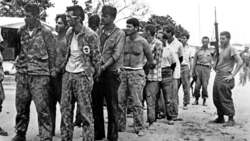 Cuban officials didn’t even need to look for a punchline for their response to new US sanctions, announced on the same day that, almost six decades ago, the failed US-sponsored invasion of the socialist island began.
Cuban officials didn’t even need to look for a punchline for their response to new US sanctions, announced on the same day that, almost six decades ago, the failed US-sponsored invasion of the socialist island began. RNA - In April 1961, a well-armed group of Cuban exiles, who were trained and financed by the CIA, landed in the Bay of Pigs with the aim of overthrowing Fidel Castro’s government. But the invaders faced a strong response from the Revolutionary Armed Forces and surrendered after just three days of fighting, while the US faced a massive international backlash for plotting the coup, RT reported.
Cuban Foreign Minister Bruno Rodríguez was quick to remind Washington of the embarrassing blunder, writing on Twitter, “Aggressive escalation of US against Cuba will fail. As in Giron (Bay of Pigs), we shall overcome.”
Rodríguez blasted the sanctions, which he called “an attack against International Law and the sovereignty of Cuba and third states”.
The head of the US Division in the Cuban Foreign Ministry, Josefina Vidal, also chipped in, promising that the US will lose once again, just as had happened in the Bay of Pigs.
Washington has announced that the US is targeting Cuba with additional sanctions, including restricting travel to the island nation, limiting remittances, and sanctioning additional entities.
White House National Security adviser John Bolton announced the new sanctions on Havana in a speech before the veterans of the failed Bay of Pigs invasion.
US citizens sending remittances to Cuba will be limited t $1,000 per person per quarter, Bolton said on Wednesday, adding, non-family travel will be restricted to reduce “veiled tourism” that benefits the Cuban government and military.
“Under this administration, we don’t throw dictators lifelines. We take them away,” he stressed, stating, “Through the Treasury Department, we will also implement changes to end the use of ‘U-turn transactions’, which allow the regime to circumvent sanctions and obtain access to hard currency and the US banking system."
The move comes a day after the White House announced it would stop issuing waivers on implementing the Helms-Burton law, which would penalize anyone in the world who did business with Cuban entities using property seized from US owners following the 1959 Cuban revolution.
“No one will take the fatherland from us, neither by seduction nor by force,” Cuban president Miguel Diaz-Canel stated on Wednesday, according to Reuters.
The US cut diplomatic ties with Cuba in 1961, and over the following decades imposed a wide range of sanctions on the island nation, just 90 miles south of Florida. Former president Barack Obama sought to soften the US policy in 2015, leading to the reopening of the US and Cuban embassies and loosening of travel restrictions.
In June 2017, however, Trump rolled back all of Obama’s changes, returning to a hard-line policy on Cuba. Additional sanctions were introduced this year, as part of the US effort to overthrow President Nicolas Maduro in Venezuela spearheaded by Bolton and Senator Marco Rubio (R-Florida), son of Cuban exiles.
The Trump administration has accused Cuba of “occupying” Venezuela, claiming that the Cuban military was helping Maduro stay in power.
847/940